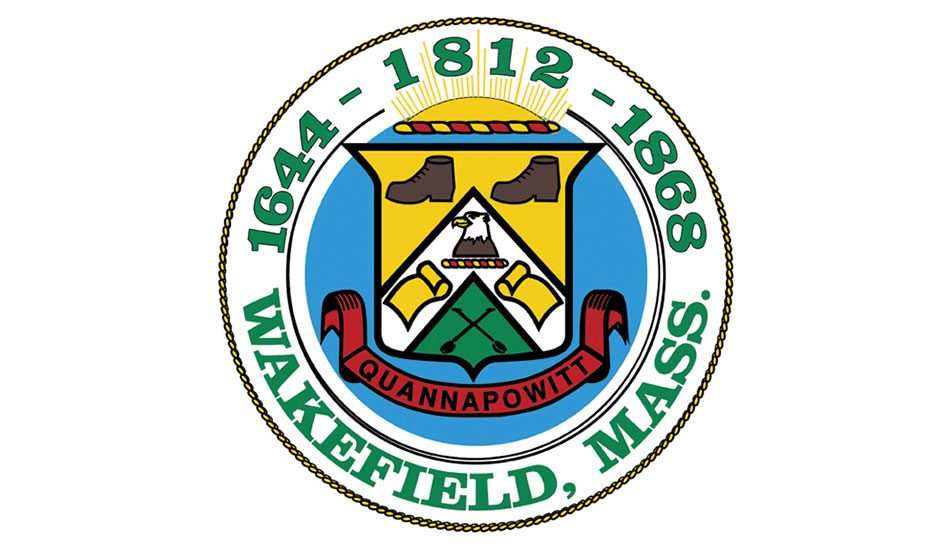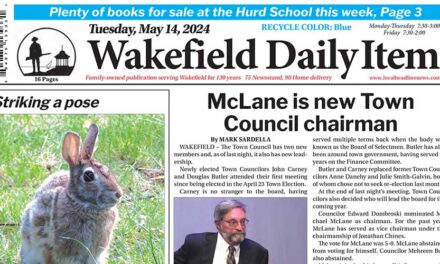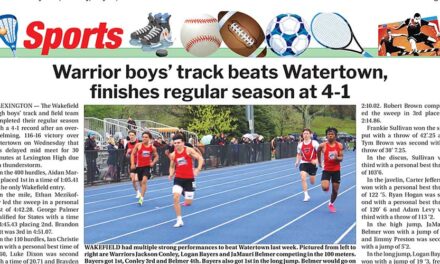WAKEFIELD — The four people running for three spots open on the Town Council in tomorrow’s municipal election touched on a wide array of topics at a forum last week, including the current state of development in Wakefield, the need for a new high school and how an influx of federal COVID-related relief dollars could be spent.
The forum, broadcast by WCAT, featured Jonathan Chines, Kaitlyn Maria Dolan, Michael J. McLane and Robert E. Vincent. Chines and McLane are incumbents. The annual town election is tomorrow from 7 a.m. to 8 p.m. at the Galvin Middle School.
Chines said money coming to town from the American Rescue Plan Act represents a “once in a lifetime opportunity” that allows Wakefield to do things that are innovative, different and exciting. Cities and towns must adhere to guidelines set for spending ARPA funds; Chines priorities are preparedness support for COVID, support for small business recovery and supporting the town’s infrastructure.
Chines noted that while a lot of Wakefield businesses came through the COVID pandemic okay, they still need help “to get over to the other side.” This includes facade improvements and money to recruit and train employees. He also said he would like to see a full walking path along North Avenue and the west side of Lake Quannapowitt.
McLane said he’d like to see part of the $5 million planned for infrastructure improvements from ARPA go towards rehabbing town-owned facilities to create more affordable housing for senior citizens.
Vincent talked about campaigning throughout town and seeing infrastructure needs in every precinct. He noted that infrastructure improvements include what’s underground too: water and sewer pipes. He continued that he’d like to see some one used to deal with the mental health of young people, who may not be over the bad experiences they suffered during COVID.

TOWN COUNCIL candidates participated in a pre-election forum this week. From left, Kaitlin Maria Dolan (participating via Zoom), Jonathan Chines, Michael J. McLane and Robert E. Vincent. (Mark Sardella Photo)
Dolan said infrastructure improvements must be a priority of ARPA spending, as should preparedness for the next COVID-like, society-altering disaster.
The candidates were asked questions by Daily Item reporters. The forum was moderated by Bill Carroll, who is also moderates Town Meeting sessions.
Candidates were asked to single out the most important issue facing the Town Council.
McLane said it is development in town. He explained that he’d like to see the entire process of reviewing the town’s bylaws — and the Zoning Bylaw in particular — sped up so they remain as up-to-date as possible. He said Wakefield is seeing a lot of new growth, “tall growth,” and for “traffic reasons and for lifestyle reasons” he’d like to see development slow down a bit.
He added that many boards are involved with development, like the Zoning Board of Appeals, which the Town Council oversees. Recently, some ZBA openings were filled. Town Councilor Mehreen Butt suggested those candidates who were not picked for the ZBA could serve on a committee that reviews the town’s bylaws. McLane said he planned to reach out to each of them to see if they’d be interested.
Bob Vincent was a member of the 2017 edition of the Bylaw Review Committee. He said that since the bylaws were codified in 1997 several bylaw committees (appointed in years ending in 2 and 7) did not look at the intricate and very involved Zoning Bylaw because “you can’t ask seven citizens or nine citizens to look at zoning when they’re not experts. We need to hire a zoning expert to give advice to the Bylaw Review Committee.”
Dolan agreed that development is a major issue in town but she took a different approach to it. She explained that education about the entire process is needed. People, she said, talk about the size and appearance of a building going up in town and wonder why it was allowed. “I think people would feel a little bit better if they understood a little more about it.” A developer cannot put up a building or construct a development anywhere they want; there is a process that needs to be followed. Additionally, Dolan said the town has an obligation to the state’s affordable housing rules. Getting more information to the public would help.
Chines said the Town Council doesn’t face one single important issue but many of them. He said it is vital that the Town Council makes sure to invest in Wakefield by fixing its roads and sidewalks, and also moving ahead with building a new Wakefield Memorial High.
The candidates all agreed that Wakefield could use the functions of a Town Planner, but differed on the level of service. Vincent said he’d like the position shared with another town. Dolan said a planner could help educate the public on the development process. Chines said the functions of such a position are needed, adding the Town Council needs to talk more about the nature of the position in order to be “thorough stewards of taxpayer dollars.” McLane supported the Town Planner position of one degree or another as well.
A new Wakefield Memorial High — built for a 21st century education — was strongly supported by all four candidates.
Dolan, a teacher at the Doyle Early Childhood Center, said the high school must be designed thoughtfully and purposefully. Advocates need to be “mindful” of the neighborhoods in the area of the Farm Street property while working toward giving students what they need for a top-rate modern education. Kids are coming to the high school from the Galvin Middle School, which was “redone in an incredible way,” and their academic needs must be met there. “We need to build for the future,” she said.
Chines is the Town Council representative on the School Building Committee and said the current high school has issues relating to access and various structural deficiencies. It is simply not designed for a 21st century education, he said. Chines said he has four children in the local public schools and explained that the way kids learn and interact today are much different than in the past. “It requires different kinds of space,” he noted.
Chines explained that the School Building Committee, with a very thorough feasibility study, voted recently to build a new Wakefield Memorial High on the Shaun Beasley Oval. “I’m excited about this option. It gives us a tremendous opportunity to create a school that is going to meet our needs for decades to come.” With this option, Chines expressed confidence that a school will be built that the whole town will be proud of. He also said there is still a long way to go in the planning process before anything is brought before the town.
McLane, who ran for School Committee 20 years ago, advocated for a new middle school at the time. He said if it had been approved, taxpayers would now be nearly done paying it off and ready to take on payment of a new high school, “which we very much need.” McLane said he’s been hearing quite a lot about how the town needs to take better care of the buildings it has in order to make them last. “Sometimes,” he said, “educational needs change. Sometimes your house just gets old. I hope this time we get it (a new high school) through.”
Vincent said he volunteered to help rewrite the town’s formal Statement of Interest, which was submitted in 2019 and approved by the state’s School Building Authority. This is a first step on the road to getting a new school built. In 2018, Vincent recalled, an accreditation group downgraded the high school’s status to the “warning” level and denied the 2018 Statement of Interest. Time, Vincent said, was of the essence so he stepped in to look at all engineering and architectural studies performed for the high school and looked at all prior Statements of Interest the town submitted. He said that if anyone knows how much Wakefield needs a new high school, it’s Vincent.
Additionally, he added, the School Building Authority’s core program has an 18 percent acceptance rate, a sign that the state — ready to commit tens of millions of dollars — feels Wakefield needs a new high school too.
The full Town Council candidates’ forum is airing on WCAT’s government cable TV channels and is available for viewing on WCAT’s Facebook page, website and YouTube channel.
The producer of the televised debate was Ally Houghton. Camera operators were Rosey Mongeau and Tom Stapleton. Joie Gerrish served as studio assistant.
WCAT staff included Executive Director Ryan Boyd, Adam Nestle, Ian McDermott, Amy Couture and Barbara Worley.





